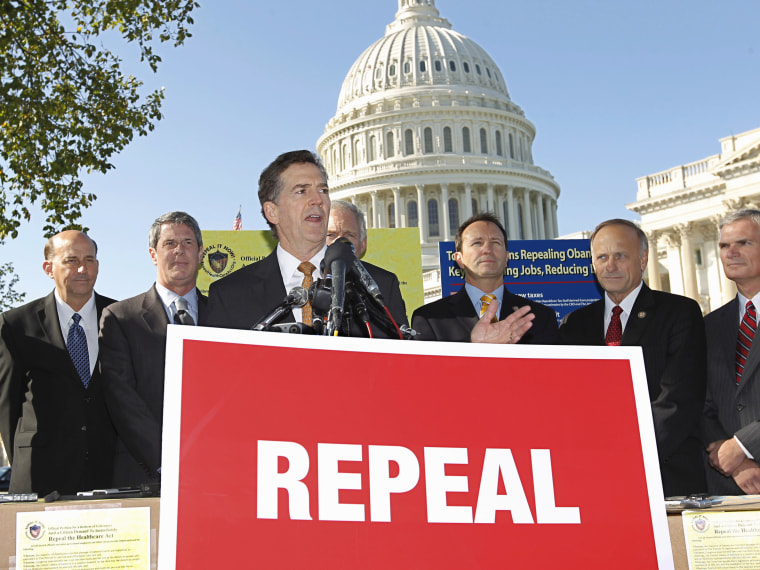It's fair to say that the Republican line on the Affordable Care Act is in flux. Whereas the party's staunch hatred of "Obamacare" had become a defining issue, voters now see GOP officials hedging on the health care law, refusing to even state opinions on the system's more popular provisions.
In recent weeks, it's Democrats who've been on the offensive on the issue, while House Speaker John Boehner (R-Ohio) concedes that repealing the Affordable Care Act "isn't the answer." Even conservative governors who rejected the law at every level are starting to change their minds.
It's against this backdrop that David Drucker reports this week that the Republicans have decided to transition away from "repeal and replace" rhetoric, because the phrase has "outlived its usefulness."
Over time, however, the term "repeal" has become identified negatively as a partisan Republican talking point that leaves voters with the impression that the GOP wants to move the country from one disliked health care system (Obamacare) to another disliked system (pre-Obamacare.) As far as a broad cross-section of Americans are concerned, their country's health care system is still in dire need of reform. That is why Republicans in the months leading up to the 2014 elections, and beyond, are likely to message their opposition to Obamacare in positive, reform-minded language like "starting over." This friendlier rhetoric has begun to appear in some GOP television ads, but Republicans say it hardly equals a party in retreat on this issue.
A GOP adviser told the conservative Washington Examiner, "We are going to be talking about Obamacare; we are just fine-tuning our message."
And at this point, that fine-tuning apparently means dropping "repeal" and adopting "starting over."
I'm not an expert on the nuances of public opinion, but I have a hard time imagining who, exactly, is supposed to find this persuasive.
To be sure, the "start over" phrase may be oddly familiar for those who've followed the debate closely. Back in February 2010, President Obama hosted a bipartisan, bicameral event at the White House to discuss health care policy, and during the discussion -- held a month before the ACA became law -- congressional Republicans said they wanted to throw out the pending bill and "start over." In fact, they used the phrase "start over" 19 times that afternoon.
But after "Obamacare" became law, Republicans quickly embraced a repeal crusade, even holding several dozen repeal votes in Congress for no particular reason.
As the 2014 elections draw closer, however, is seems "repeal" has lost its luster, so GOP officials are going back to the "start over" rhetoric from more than four years ago.
The trouble is, does anyone seriously want to start over on health care reform? Are there are sizable numbers of Americans out there thinking, "What I really want is several more years of Congress fighting over health care reform"?
I rather doubt it.
For that matter, it's equally hard to imagine the millions of Americans benefiting from the ACA will want to roll the dice on an entirely new system created by Republicans after we "start over." What kind of system will consumers have after GOP officials have started over? They have no idea, and Republicans refuse to offer any kind of details to anyone, but they're confident voters will want to take a chance anyway.
It sounds like some additional "fine-tuning" is in order.
